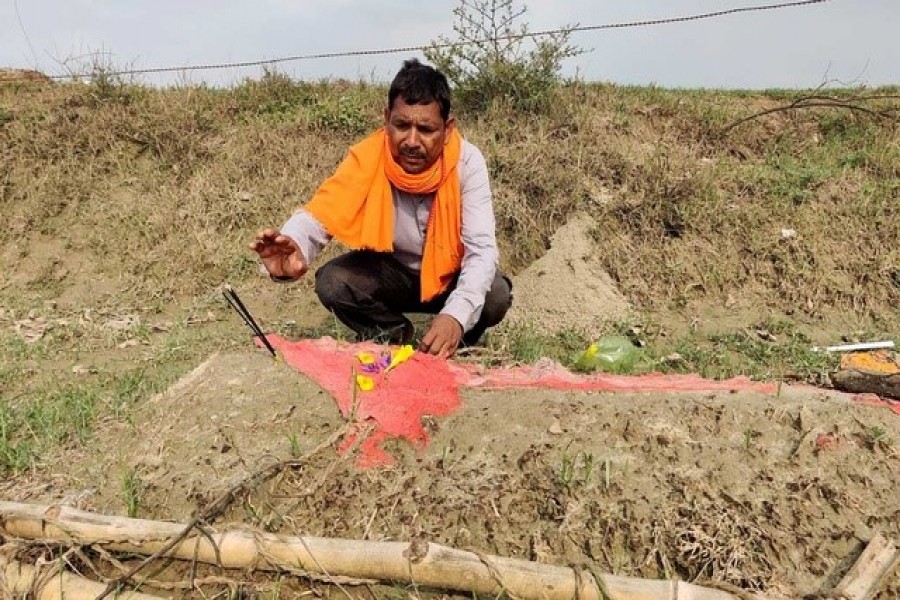Govind Pasi, a grassroots member of India's Bharatiya Janata Party (BJP), says he got no help from his connections in the ruling party when his wife contracted coronavirus and died at home for lack of proper treatment.
Now, he says, he is done with the party that has ruled India since 2014 and with its leader, Prime Minister Narendra Modi.
"I am heart-broken, nobody came to help us when we needed help the most," said Pasi, 45, speaking in Balai village in Uttar Pradesh state. Nearby, on the banks of the Ganges river, scores of bodies of people believed to have died of Covid-19 have washed up.
Anand Awasthi, a district vice president of the BJP, said he was aware of the death of Pasi's wife and that the party was trying to get him monetary compensation. He said there was some confusion around her death relating to whether a government database established she had Covid, but did not have details.
Pasi is among more than a dozen ground and mid-level BJP members who told Reuters they are disillusioned with the government's handling of the coronavirus pandemic that has devastated India. In addition, six state lawmakers in Uttar Pradesh have written letters criticising the government for not responding to frantic calls for help from their constituents, which Reuters has reviewed.
A high-profile national level BJP official in New Delhi said he was taking a sabbatical because of the "failings of providing basic medical care, mixed messaging on lockdowns, abysmal medical oxygen cylinder shortages and clear lack of priority".
He spoke on condition of anonymity, citing worries about a backlash for stepping out of line.
The BJP is a mammoth organisation, claiming 150 million members, and Reuters could not determine the degree to which the unhappiness has spread. But it is highly unusual for those within the party to speak out against Modi, who has dominated Indian politics in his seven years in power and whose control of the BJP has been unquestioned.
The BJP headquarters and the prime minister's office did not respond to requests for comment.
Kailash Vijayvargiya, a senior BJP leader who is one of its nine general secretaries, told Reuters he had no knowledge of any unhappiness or dissent within the party.
"The pandemic was tough for everyone and we know some of our workers also lost their loved ones," he said. "At so many levels we have helped each other and there were times when we could not because the situation has been very difficult."
Modi, a Hindu nationalist who gets wide support in the country's majority community, has faced criticism before, including for a shock demonetisation that threw the economy into disarray and haphazard tax reform. But the shortage of hospital beds and medical oxygen in the Covid crisis and the country's stuttering vaccination programme have battered his reputation for action and competence, analysts and opposition leaders say.
Analysts say public anger over the handling of the pandemic coupled with even some disaffection in the party rank-and-file could hurt the BJP when it faces its next political test - an election early next year in politically crucial Uttar Pradesh, India's most populous state and currently ruled by the BJP.
ELECTION MACHINE
The party's formidably successful election machine rests on a volunteer army of people like Pasi, grassroots workers in the countryside who know voters intimately, make sure they come out to vote and manage the election at the booth level.
Suhas Palshikar, a columnist and former professor of political science who has written extensively about the BJP, said unhappiness among these people could be critical.
"This will surely mean less voter mobilisation in favour of BJP and therefore a crisis in constituencies that are borderline in terms of margin of victory/defeat," he said. However, he added that the Uttar Pradesh election was still six months away, which was "a long time in politics".
Doing badly in Uttar Pradesh would be a major setback for the BJP, analysts say, and could have a knock-on effect on the next general election, although that is not due until 2024.
According to two opinion polls last month, Modi's approval ratings have fallen to a historical low. But his ratings still remain far above leading opposition figures.
The lack of unity in the opposition would be another plus for Modi in any election, analysts say. Some of the smaller political parties have said they need to come together to defeat Modi, but the main opposition Congress party has not commented on the issue.
Meanwhile, the government has launched efforts to win back public support. As the wave of Covid infections tapered this month, Modi appeared on national television to spell out how he will tackle the pandemic and aides have launched a publicity offensive on the number of vaccinations carried out.
It was too early to say if the efforts had tempered any anger over the government's handling of the crisis.
Om Gaur, the national editor of one of the largest-selling newspapers, the independent Dainik Bhaskar, however said ground reports from 12 of India's 28 states indicated the BJP had been severely damaged by the handling of the pandemic and that "the PM has never had such a tough moment in the past seven years".
"Policy failure has enraged even those who were Modi loyalists, they continue to support his outlook on religion and nationalism, but question his ability to manage the crisis," he said.
Muralidhar Rao, another BJP general secretary, said he was not aware of any anger against Modi "whether it's in the party or among voters".
"Whatever happens in upcoming elections, that cannot and should not be discussed right now, we have to focus on vaccinating the entire eligible population and that is the main agenda."


